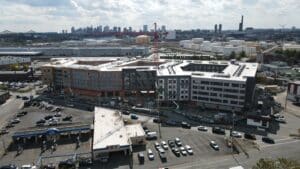
An aerial view of developer Greystar’s 450-unit Anthem Everett apartment complex at 35 Garvey St., which is scheduled for completion in mid-2024. Photo courtesy of Greystar
Multifamily operators are seeing their properties’ running costs continuing to grow, albeit at a slower rate than in years past according to a new report from real estate data firm Yardi Matrix.
The report analyzed data from over 22,000 properties that use the company’s software.
By region, the Southeast recorded the largest increase in costs, up 8.8 percent. Next were the West (7.3 percent), the Midwest (6.4 percent), the Southwest (6.0 percent) and the Northeast (4.7 percent). By market size, tertiary markets posted the largest increase (7.9 percent), followed by secondary markets (7.1 percent) and gateway markets (5.4 percent) like Boston, Los Angeles and New York.
In Boston, Yardi Matrix pegged overall operating expense growth at roughly 6 percent year-over-year, with the combined Worcester and Springfield areas clocking in a mere 0.2 percent growth, the second-lowest in the country.
The Yardi Matrix researchers pinned most of the blame on general inflation – from wages to materials to services – every American business and consumer has dealt with over the last few years, but also noted rising insurance costs are taking their toll, particularly in more disaster-prone areas like the Southeast.
Tallahassee, Florida led the 129 markets broken out by Yardi Matrix in the study, with a 131.9 percent increase in insurance costs year-over-year. Forecasters predict an especially strong hurricane season this year.
Insurance growth at Boston-area properties was estimated at slightly over 20 percent, while the combined Worcester and Springfield areas’ growth was only 6.7 percent, the 10th-lowest nationally.
Still, 2023 rent growth in many markets appears to be helping cushion hits to multifamily properties’ net operating income. Nationally, the difference between the average annual gross income per unit and expenses equaled a $463 increase in NOI, Yardi Matrix said.
While many Sun Belt markets that are benefiting from a pandemic-era multifamily building boom whose products are starting to deliver, driving down rents, market-wide Greater Boston asking rents merely held stable last year according to data from Colliers, while rents at high-end properties in Boston, Cambridge and Brookline rose 4 percent according to information from The Collaborative Cos. Several of the Boston area’s biggest multifamily landlords and developers have cited a steep drop-off in multifamily construction permits in 2022 and 2023 as evidence for continued upward pressure on rents across the region this year.




 |
| 

